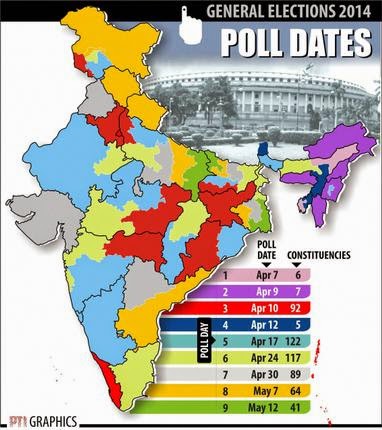The world's largest democracy is currently undergoing elections. You'd expect that an event of this magnitude would get serious attention on the world's stage. And that it would attract some attention in the US media.
I was surprised to see that the event did not merit even a metion in passing. Not even in programs covering world affairs. There were 2 exceptions. An opinion ed in the New York Times and a unique take on the subject by British comedian John Oliver. Together they give an awesome insight into an amazing event.
The New York Times Op Ed
"
The Biggest Election
By THE EDITORIAL BOARD
MARCH 11, 2014
A growing population guarantees that every national election in India is the largest election ever held. This year is no exception. More than 814 million citizens are eligible to vote in national elections scheduled to begin on April 7 and conclude on May 12. Much is riding on the results, which are expected on May 16.
The Election Commission of India has time and again performed the amazing feat of getting mind-boggling numbers of voters to the polls — and then counting all those votes. There is every reason to believe that this next mammoth democratic exercise will be free and fair.
Polls indicate that the Hindu nationalist Bharatiya Janata Party is likely to win the most seats, though probably not enough to form a government without support from one or more of India’s large regional parties. This leaves a very slim chance that the Indian National Congress could cobble together enough seats to remain a part of a governing coalition. There are many wild cards, including the impact of India’s new Aam Aadmi Party, whose anticorruption campaign resonates with many voters.
India’s national elections are an achievement, but are only one of the pillars on which democracy depends. And here India’s democracy has proved far shakier. Its Constitution promises much: It guarantees essential democratic rights, including equality before the law and freedom of religion and expression. It prohibits discrimination based on religion, caste or race, and it guarantees the right to an education. The Constitution also explicitly prohibits exploitation, forced labor and child labor.
Yet in many of these areas, the country has fallen tragically short. While a vibrant economy has created a record number of billionaires and an aspiring middle class, grossly exploitive working conditions are the lot of many Indians, including children. The vast majority of young children are now enrolled in primary school, but many attend schools so poorly staffed and equipped that they cannot learn. The court system remains inefficient, with far too many cases languishing without resolution. Attacks on freedom of expression are increasingly common, with pressure and threats of the crudest kind casting a dangerous chill on the free exchange of ideas and opinions. These conditions pose serious threats to India’s open society.
That’s why the next election will be crucial. Voter turnout is expected to be high. Indians hold dear their power to express their hopes and vent their frustrations at the ballot box. But if the next government cannot deliver the freedoms enshrined in the Constitution, India’s democracy will have failed its citizens.
http://www.nytimes.com/2014/03/12/opinion/the-biggest-election.html?_r=0
"
And the extremely funny John Olivers take on the India Elections and the US media.




No comments:
Post a Comment